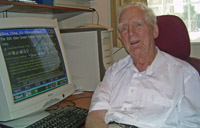News
Shared passions: remembering Bill Ainsworth

We first met Bill Ainsworth at an East Midlands Local History Fair being held at Lincoln Castle in July 1987, when he came along to see if it was something he and his colleagues in the newly formed Birmingham & District Association of Local History Societies* could emulate. What Bill didn't tell us was that the then infant Association had been his idea, promoted by Barr Local History Society and enthusiastically supported by Patrick Baird, then Head of Local Studies at Birmingham Central Library. The rest, as they say, is history.
Susan and I became friends with Bill instantly, a heady mix of a shared love for local history and Birmingham, Susan's Black Country roots and the fact that we were all life-long socialists. Over the years, plenty of other shared passions and interests emerged, but for thirty minutes on a sunny summer's afternoon in Lincoln it was not a bad start. From then on, we would see Bill a couple of times a year at least at local history events and in one another's homes.
Bill went home from Lincoln inspired by what he had seen and heard and the first West Midlands Local History Festival was held in 1989 and has, in some shape or form, been a regular event ever since. Bill, typically, led from behind and was B&DALHS Vice-Chair for many years and the first editor of The Birmingham Historian, which was started in 1987 and which became another link between us.
What made Bill different was that he even though he came to local history late in life, when he was 70, he was an accomplished administrator, innovator and researcher. Most of us would like to think that we have one or two of these skills at best. He wrote about many topics, but his passion was Bingley Exhibition Hall in Birmingham, which opened in 1850, although as Bill's history reveals, its links with the site go back much further. As and when he completed chapters or a particular line of research, he would also write an article for The Birmingham Historian and for his 90th birthday his family pinched a copy of his files from his computer and had what he had already written privately published in book form.
Last spring, Bill telephoned and told us that he had been diagnosed as suffering from lung cancer and he would like Susan's help to get his Bingley Hall research onto the Internet** and to place a copy of his book in the British Library. We saw Bill twice last year and will never forget a memorable lunch in a country pub, when we dined on Black Country faggots and Spotted Dick and custard, as Bill spoke about his life and passions, which included promoting nature conservation and wholefood living after the Second World War. He also spoke of meeting his wife Gwen at a Young Communist League camp in 1935, that it was love at first sight and how quickly they married, how his politics got him the sack on several occasions and much more besides. At the end of that day with Bill and Molly, who had come into his life just as romantically as Gwen when he was 83, he let me take take his photograph. On his computer, in large print, for his eyesight had been failing for some years, you might just make out that he was reworking chapter 12 of Bingley Hall.
To the end, Bill was tenacious, even though he had to leave Molly behind in late-2008 and move to Sheffield, so that his daughter Ruth and her partner Barrie could care for him. We spoke on the telephone a few times and on the last occasion it was the day before he moved to Rotherham Hospice, where he passed away peacefully on 27 December 2008, aged 93. His Humanist funeral was a moving experience attended by friends and family.
Robert Howard
*A full account of the Association's origins, written by Bill (but minus any reference to his own contribution), can be found at: www.bdlha.org/ on 'The Historian' page shown in the left-hand column.
**Bingley Hall by William S Ainsworth online at: www.local-history.co.uk/bh.
16 February 2009
